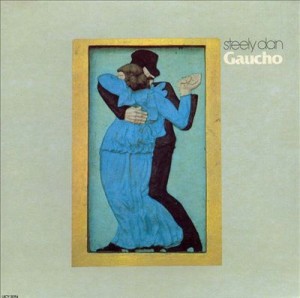 By Ariel Swartley
By Ariel Swartley
Rolling Stone
The thing you begin to notice, listening to Steely Dan’s songs, is that no one ever answers anyone. For all the talk — and their latest album, Gaucho, is as compulsively chatty as dinnertime on death row — there’s no conversation. Whoever keeps asking, “Who is that gaucho, amigo?” might as well be talking to the wall.
Even the melody of “Gaucho” just throws the singer’s questions back at him, jumping up the scale as his intonation rises, swooping down as his voice trails off in bewilderment, echoing and exaggerating his phrasing. Naturally, the guy gets a little hysterical as the game goes on, but not so much so that he can’t remember details — such as everything that freaky gaucho was wearing. To Steely Dan’s constantly talking heads, surfaces seem very clear. It’s only people who are indistinct: shadow figures, possibly hallucinations, always unknown quantities.
But sometimes that’s a godsend. In “Hey Nineteen,” the satire is straightforward enough. Between a thirty-five-year-old’s nostalgia and a nineteen-year-old’s nonchalance, there’s not a lot of rapport (“No we can’t talk at all”). Yet the composition ends in a blessedly fuzzy epiphany, with the generation gap bridged by Cuervo Gold and fine Columbian. The labels are important — Steely Dan’s characters seem to know the world exclusively through brand names. These characters are the true “heads”: solitarily confined intelligences who’ve had to order all their experience from a catalog. But oh, with the right blurring agents, not knowing can be a beautiful thing.
It’s always been a problem with Steely Dan to figure out who’s being ironic about whom: Walter Becker and Donald Fagen’s cynicism blasts pretty indiscriminately. In the past, the saxophone used to give you a clue. On Katy Lied, it played the warm substance to Dr. Wu’s sinister shadow. On Aja, it was Deacon Blue’s salvation, and the LP’s as well. But the horns on Gaucho don’t cut loose — they lick at the melody.
There is no release. Potentially passionate outbursts, like the guitars at the end of “Third World Man,” are damped down fast by cool, muted choruses. And whenever something wholly satisfying and seemingly spontaneous does slip out — e.g., the line about the Santa Ana winds in “Babylon Sisters” — you wait almost forever for it to be repeated.
After years of hibernation in the studio, the metamorphosis that began with The Royal Scam is complete. Steely Dan have perfected the aesthetic of the tease. Their sound is as slippery as their irony. Are those the trumpets of angels near the end of the title tune? Could that slouching gaucho, the one denied a room in the singer’s high-rise inn, be the new messiah? On Gaucho, the melodies are questions, too — long-winded, probing, unresolved.
There are people who will tell you that that’s not enough. That Steely Dan have fallen into the dread imitative fallacy, making a record as desolate as the self-absorbed paranoids they describe. But I don’t think so. For all their sneering sendups of the superficial, the current and the hip — their name-dropping characters, those Szechuan dumplings at Mr. Chow’s — they take a sensualist’s delight in names and surfaces. Donald Fagen’s tongue slithers over a phrase like “Brut and charisma,” tasting the syllables, appreciating the copywriter’s wit in the civilized machismo of the continental spelling. That appreciation of, and absorption in, detail lends substance to Steely Dan’s obsession with surfaces. And, accuracy being satire’s cutting edge, it also makes their songs funnier than their characters realize.
Yet Gaucho is more than a good laugh or a twinge of recognition. If you leave a question hanging long enough, it becomes practically metaphysical. (Are you with me, Dr. Wu?) And that’s a loophole big enough to let the angels in. If, like Steely Dan’s characters, you’re not quite sure about what’s real, then you have no way of knowing what’s out of the question either. The water, as they sing in “Time Out of Mind,” “may change to cherry wine.”

Great Review, much like Bob Dylan, lots of questions, not many answers. That’s for us to figure out as we choose to, or choose not to.